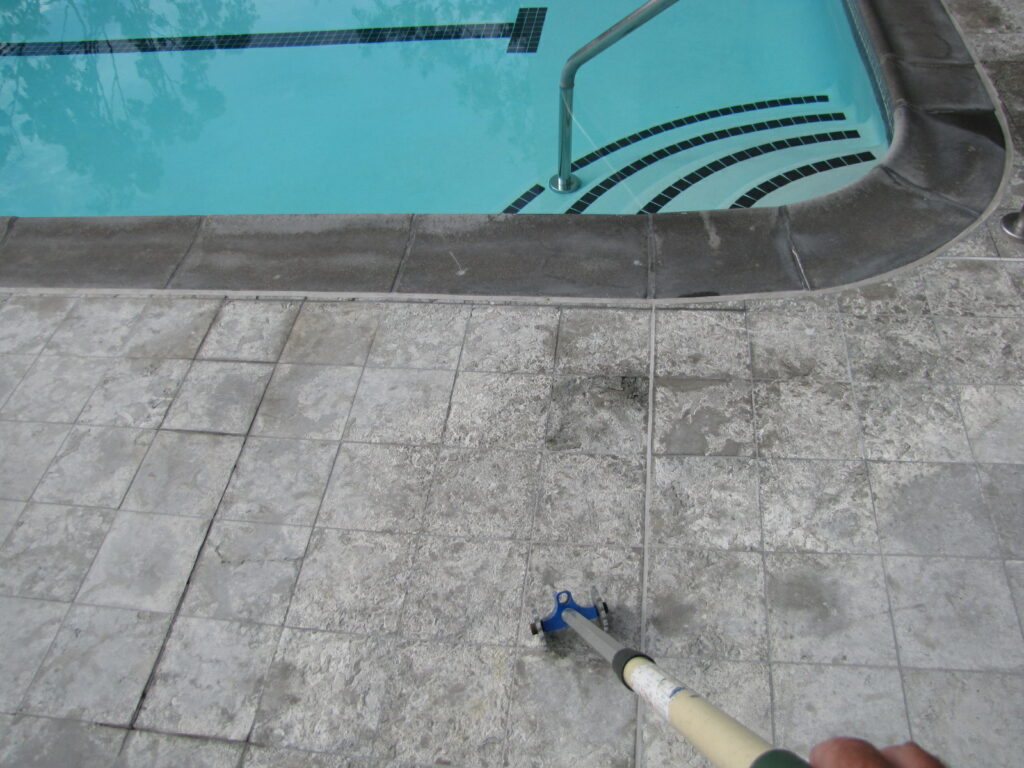No products in the cart.
Case Study
Limestone Spalling Failure on Exterior Deck

The Problem
Investigation of Spalled Limestone Exterior Deck Background: A 31 story condominium development had installed approximately 11,627 square feet of Jerusalem limestone tile on a suspended exterior deck floor located on the 6th level of the building. The natural stone installation was installed about 3 years earlier as a replacement of the original tile. The stone started showing indications of deterioration and cracking not long after the stone installation was completed. Approximately 40% of the stone was excessively spalled, which is a condition that can occur with natural stone when it is subjected to excessive moisture. Spalling is a term for the surface of a stone that deteriorates and is the symptom of a stone being subjected to continuous and excessive moisture over time. Spalling is typically caused by moisture migrating from the stone's underlying substrate up through the stone to its surface where the moisture evaporates. As the moisture travels from under the stone through the cementitious materials, and through the stone itself, the moisture picks up various minerals (salts) which dissolve in the moisture. When the moisture reaches the surface of the stone it evaporates and the minerals precipitate into a solid again. This expansion or crystallization of the mineral, referred to as efflorescence, causes the surface of some stones to deteriorate. Request: CTaSC was asked to investigate and inspect the exterior pool deck to determine the cause of the spalling limestone, to determine the extent of the problem, to determine if the installation met industry standards, and to determine how best to remediate the problems.The Solution
Inspection Findings:- Approximately 40% of the stone was excessively spalled, which is a condition that can occur with natural stone when it is subjected to excessive moisture. Spalling is a term for the surface of a stone that deteriorates and is the symptom of a stone being subjected to continuous and excessive moisture over time. Spalling is typically caused by moisture migrating from the stone's underlying substrate up through the stone to its surface where the moisture evaporates. As the moisture travels from under the stone through the cementitious materials, and through the stone itself, the moisture picks up various minerals (salts) which dissolve in the moisture. When the moisture reaches the surface of the stone it evaporates and the minerals precipitate into a solid again. This expansion or crystallization of the mineral, referred to as efflorescence, causes the surface of some stones to deteriorate.
- Approximately 25% of the stone sounded hollow to some degree when acoustically tested with a Delamination Detection Testing device following the ASTM D4580 test protocol.
- The stone was randomly, but systematically, surveyed for moisture content using an electronic moisture meter that qualitatively measures relative moisture. Overall the moisture readings were very high, within the 100 point reference scale, ranging from 90 to 100.
- Ten (10) stones were removed in areas near and away from the pool. The removed stones had various hollow sounding and solid sounding conditions, were spalled or not spalled, and had or didn't have cracks.
- The weep holes at the drains were plugged and did not have any weep hole protection to prevent plugging.
- The primary waterproof membrane was not positively sloped to drain. It was found to be negatively slopped in various directions.
- Attic stock and distressed samples were petrographically evaluated by a geologist.
- It was concluded that this stone was potentially susceptible to deterioration from repeated wetting/drying cycles in the presence of any water containing dissolved ions that can combine to form salts. These features are not typical of limestone with good weathering properties.
- Both the salt water pool water and the irrigation water showed levels of sodium and chloride, among other anions and cations.
- The primary cause of the stone becoming excessively spalled and deteriorated on its surface is because it is being subjected to continuous moisture that migrates through the stone assembly.
- The cause of the excessive moisture is that the primary waterproof membrane is not properly sloped to the drains, which in effect results in a reservoir of water collecting under the stone assembly.
- As the stone deck is subjected to pool splashing/dripping residuals, to rain, and weekly maintenance by being washed down, the reservoir is continually being replenished.
- There are other deficiencies within the stone and how the stone was installed that compounds this problem of retaining moisture, subjecting the stone to excessive moisture, and that results in the deterioration of the stone surface.
- The only way to prevent this spalling condition from reoccurring is to remove all of the tile and the underlying substrate and membrane down to the structural slab.
- Then the structural slab surface will need to be ground, and fill to achieve a flat surface with a 1/4" per foot slope to drain.
- An appropriate waterproof membrane should then be applied over the properly prepared substrate.
- Using a drainage mat over the primary waterproof membrane throughout the installation would be recommended to help facilitate the evacuation of water.
- A wire reinforced mortar bed is then recommended over the drainage mat.
- Movement joints should be installed per TCNA EJ171.
- The stone should be adhered to the mortar bed with a high performance polymer modified thin-set mortar that meets ANSI A118.15. An appropriate grout should be used.
